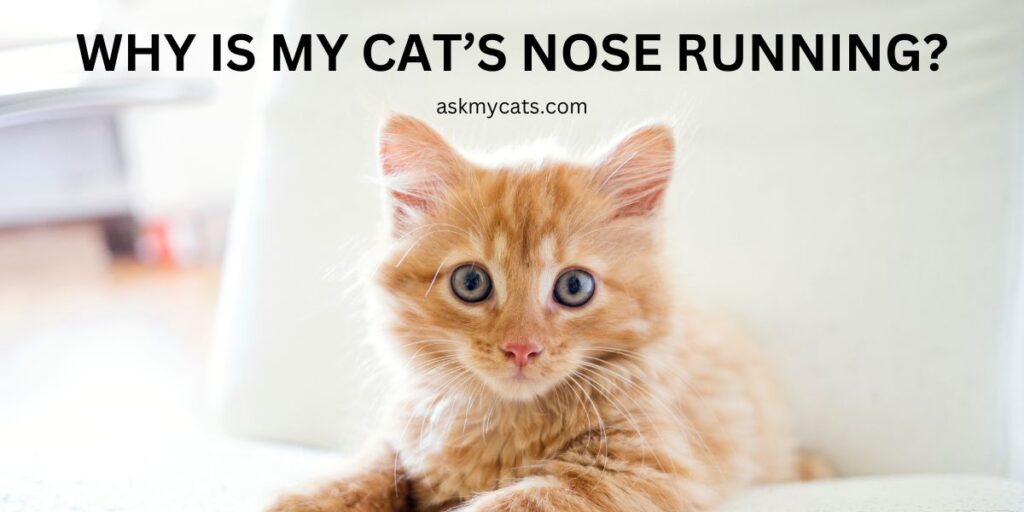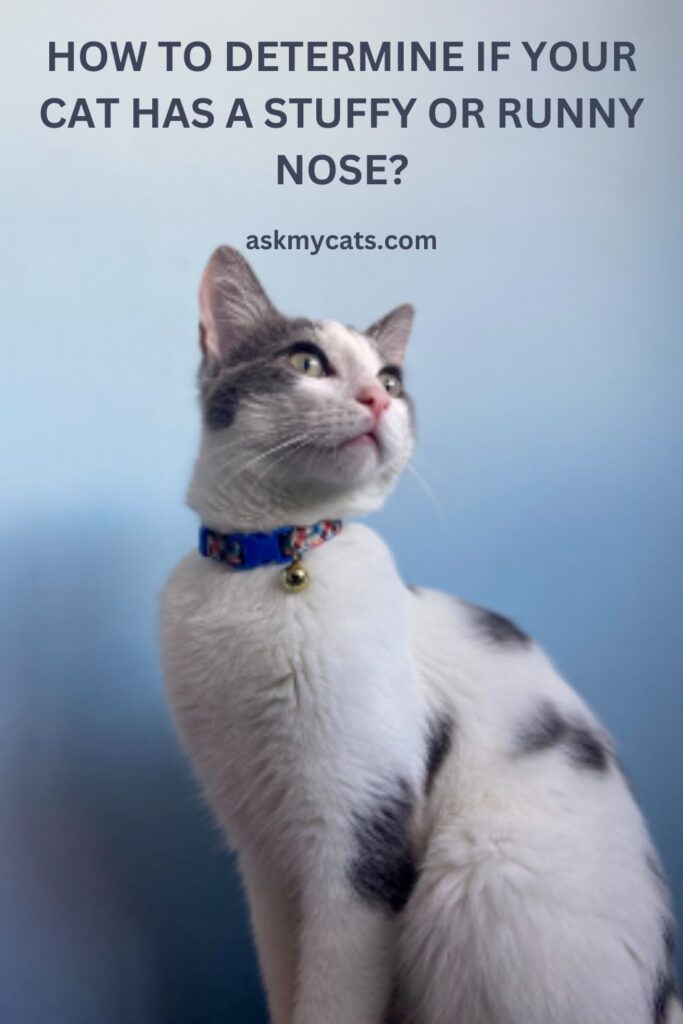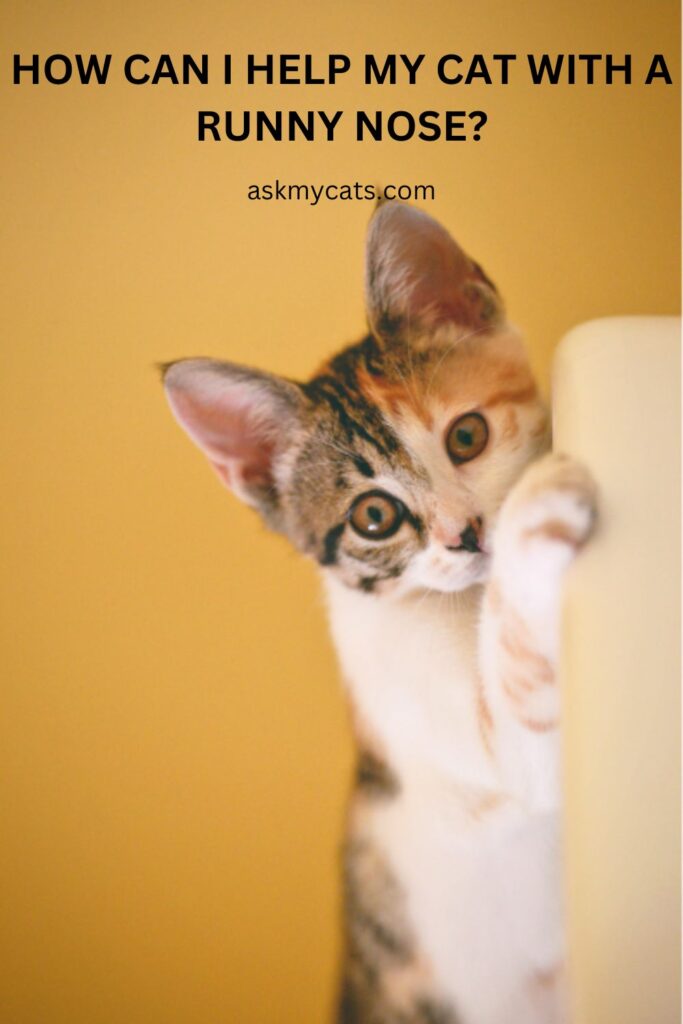If you’re a cat owner, you may have noticed your furry friend’s nose occasionally running. It’s not uncommon for cats to experience a runny nose, but it can be concerning if it happens frequently or is accompanied by other symptoms.
In this article, we’ll explore the reasons behind a cat’s runny nose and what you can do to help your feline friend feel better.
From allergies to infections, there are several factors that could be causing your cat’s nose to run, so let’s dive in and learn more.
Key Takeaways
- Cats can experience a runny nose due to various reasons, including allergies, infections, foreign objects, dental problems, and environmental factors.
- Symptoms of a runny nose in cats include clear or cloudy discharge from the nostrils, sneezing, watery eyes, loss of appetite, lethargy, and fever.
- To help a cat with a runny nose, clean their nose with a warm, damp cloth, provide plenty of fluids, increase humidity in the environment, offer supportive care such as a warm and comfortable resting place, and seek veterinary care if the runny nose persists for more than a few days or is accompanied by other symptoms.
- Whether a cat’s runny nose will go away on its own depends on the underlying cause, and it’s important to consult a veterinarian for proper diagnosis and treatment.


Give Your Cat the Perfect Day
Get the Free Ebook!
Common Causes Of A Running Nose In Cats

Here are some common causes of a running nose in cats:
- Allergies: Cats can be allergic to a variety of substances, including pollen, dust, and certain types of food. An allergic reaction can cause the cat’s nose to run, and it may also cause other symptoms such as sneezing and itching.
- Infections: A cat’s runny nose may be caused by a viral or bacterial infection. Common infections that can cause a runny nose in cats include feline herpesvirus and calicivirus. These infections may also cause other symptoms such as coughing, fever, and lethargy.
- Foreign objects: Cats are curious creatures and may sniff or inhale foreign objects such as grass, dust, or even small toys. If a foreign object gets stuck in the cat’s nasal passage, it can cause the cat’s nose to run.
- Dental problems: Dental issues such as tooth decay or gum disease can also lead to a runny nose in cats. This is because the sinuses are located near the teeth, and an infection in the mouth can spread to the sinuses and cause a runny nose.
- Environmental factors: Environmental factors such as changes in temperature, humidity, or air quality can also cause a cat’s nose to run. Dry air, for example, can dry out a cat’s nasal passages, leading to a runny nose.
If your cat’s nose is running frequently or if it is accompanied by other symptoms, it’s important to take your cat to the vet for a proper diagnosis and treatment.
Must Read: How To Clean A Cat’s Nose? Safely and Effectively!
How To Determine If Your Cat Has A Stuffy Or Runny Nose?

A runny nose is characterized by a discharge of mucus or fluid from the cat’s nostrils. The discharge can be clear, cloudy, or colored, and it may be constant or intermittent. A cat with a runny nose may lick or wipe their nose frequently, and may also sneeze.
On the other hand, a stuffy nose is characterized by congestion in the cat’s nasal passages, which can make it difficult for the cat to breathe.
A cat with a stuffy nose may breathe through their mouth more often than usual, make snuffling sounds when they breathe, and may even snore.
Both a runny nose and a stuffy nose can be caused by a variety of factors, including allergies, infections, foreign objects, dental issues, and environmental factors.
The symptoms of a runny nose and a stuffy nose in cats can overlap, but there are some differences. Here are some symptoms to look for:
Symptoms of a runny nose in cats
- Clear or cloudy discharge from the nostrils
- Sneezing
- Licking or wiping the nose frequently
- Watery eyes
- Loss of appetite
- Lethargy
- Coughing
- Fever
Symptoms of a stuffy nose in cats
- Breathing through the mouth more often than usual
- Snuffling sounds when breathing
- Snoring
- Lack of interest in food or treats
- Reduced sense of smell
- Lethargy
- Coughing
- Sneezing
Interesting Read: Why Do Cats Have Wet Noses?
How Can I Help My Cat With A Runny Nose?

If your cat has a runny nose, there are several things you can do to help them feel more comfortable:
- Keep their nose clean: Gently wipe your cat’s nose with a warm, damp cloth to remove any discharge. Be sure to use a different part of the cloth for each wipe to avoid spreading any infection. You can also use saline drops to help loosen and remove any mucus.
- Provide plenty of fluids: Encourage your cat to drink plenty of water to help thin out any mucus and prevent dehydration. You can also offer low-sodium chicken or beef broth to entice them to drink more.
- Increase humidity: Dry air can irritate your cat’s nasal passages, so increasing the humidity in your home can help. You can use a humidifier or simply place a bowl of water near your cat’s favorite resting spot.
- Offer supportive care: Provide your cat with a warm and comfortable place to rest. Keep their litter box nearby so they don’t have to exert themselves too much to use it.
- Seek veterinary care: If your cat’s runny nose persists for more than a few days, or if they show other signs of illness such as coughing, sneezing, or fever, it’s important to seek veterinary care.
Your veterinarian can perform a physical exam and run diagnostic tests to determine the underlying cause of your cat’s symptoms and recommend an appropriate course of treatment, which may include antibiotics, antiviral medications, or other supportive care measures.
Must Read: Home Remedies for Cat Runny Nose
Will My Cats Runny Nose Go Away On Its Own?
Whether your cat’s runny nose will go away on its own depends on the underlying cause. If the runny nose is caused by a mild respiratory infection, it’s possible that the symptoms will resolve on their own within a few days to a week.
However, if the runny nose is caused by a more serious condition, such as a bacterial or viral infection, it’s important to seek veterinary care.
It’s important to note that a runny nose can be a symptom of a variety of conditions, including infections, allergies, and dental issues.
If your cat’s runny nose persists for more than a few days, or if they show other signs of illness such as coughing, sneezing, or fever, it’s important to seek veterinary care.
Interesting read: Why Do Cat’s Noses Get Wet When They Purr?
The Potential Complications Of A Persistent Running Nose In Cats
If your cat’s runny nose persists for an extended period of time, it can lead to potential complications, such as:
- Dehydration: Constant discharge from the nose can cause your cat to lose fluids, leading to dehydration. This can be especially dangerous for kittens and senior cats.
- Secondary infections: A runny nose can weaken your cat’s immune system and make them more susceptible to secondary infections, such as pneumonia or bronchitis.
- Chronic inflammation: Chronic inflammation of the nasal passages can lead to long-term damage, such as scarring and thickening of the tissues, which can result in breathing difficulties.
- Reduced sense of smell: A persistent runny nose can also affect your cat’s sense of smell, which can lead to a loss of appetite and other health problems.
- Oral health issues: If your cat has a runny nose, it may lick its nose frequently, which can lead to oral health issues such as dental decay or gum disease.
Interesting Read: Cat Nasal Congestion: Unblocking the Sniffles
When To Seek Veterinary Treatment For A Running Nose In Cats?
It’s important to seek veterinary treatment for your cat’s runny nose if:
- The discharge is thick, yellow, green, or bloody.
- Your cat is having difficulty breathing or has noisy breathing.
- Your cat is coughing or sneezing frequently.
- Your cat has a fever, loss of appetite, or appears lethargic.
- The runny nose persists for more than a few days.
- Your cat is showing any other signs of illness or distress.
Must Read: How To Make A Cat Sneeze To Clear Nose?
How To Prevent A Runny Nose In Cats?
Preventing a runny nose in cats involves several measures:
- Vaccination: Make sure your cat is up-to-date on their vaccinations, as many respiratory infections can be prevented with vaccines.
- Regular vet check-ups: Take your cat to the veterinarian for regular check-ups to detect any health problems early and prevent them from becoming more serious.
- Clean environment: Keep your cat’s environment clean and free of irritants that can cause respiratory problems. This includes cleaning the litter box frequently, vacuuming regularly, and avoiding smoking around your cat.
- Healthy diet: Feed your cat a well-balanced diet that includes all the necessary nutrients to support their immune system.
- Good hygiene: Wash your hands before and after handling your cat to prevent the spread of germs, and keep their food and water bowls clean.
- Limit exposure to other cats: If you have multiple cats, keep sick cats separated from healthy cats to prevent the spread of infection.
- Address dental issues: Address any dental issues promptly, as tooth or gum infections can cause respiratory problems.
Interesting Read: Why Does My Cat Have A Dry Nose?
Frequently Asked Questions
What are the common causes of a runny nose in cats?
The common causes of a runny nose in cats include viral and bacterial infections, allergies, foreign objects, and dental issues.
What is the difference between a stuffy nose and a runny nose in cats?
A stuffy nose occurs when the nasal passages are blocked, while a runny nose occurs when there is excessive discharge from the nose.
How can I determine if my cat has a stuffy or runny nose?
If your cat is breathing through their mouth and making snoring sounds, they likely have a stuffy nose. If they have excessive discharge from their nose, they likely have a runny nose.
Final Words
A runny nose in cats can be caused by a variety of factors, including infections, allergies, foreign objects, and dental issues. It’s important to seek veterinary attention if your cat’s symptoms persist or worsen.
Taking preventive measures such as regular vet check-ups, a clean environment, a healthy diet, good hygiene, and limiting exposure to other cats can help reduce the likelihood of your cat developing a runny nose and other respiratory problems.
Must Read: Effective Home Remedies for Cat Nasal Congestion
Interesting Read: Why Does My Cat Nose Bump Me?
References
- https://www.petmd.com/cat/conditions/respiratory/c_ct_nasal_discharge
- https://oathall-vets.co.uk/wp-content/plugins/vetstream_swagger/pet-health/pet/pet_info_print.php?vetstream-type=ZmVsaXM=&nodeguid=f88f2bbf-ceea-4dbf-8909-8d762f06f6c1
- https://vcahospitals.com/know-your-pet/chronic-upper-respiratory-tract-disease
